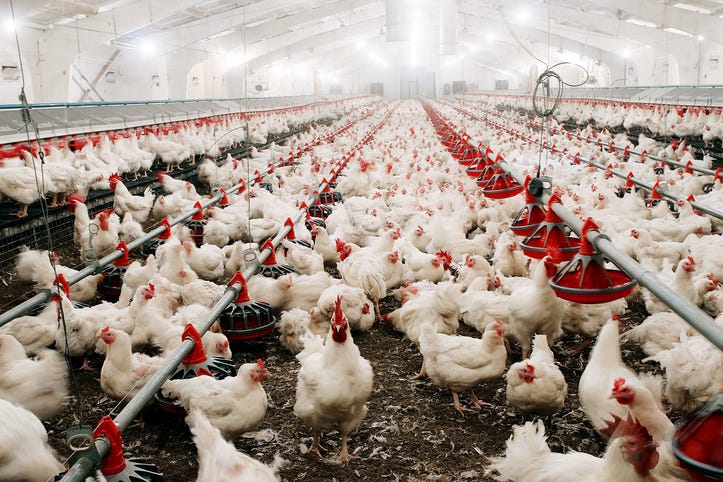
New research shows the overuse of antibiotics in livestock is actually making bacteria more resistant and dangerous to the human immune system.
The study, led by the University of Oxford and published in the journal eLife, also found that farmed pigs and chickens could harbor large reservoirs of cross-resistant bacteria, capable of fueling future epidemics.
"We've accidentally ended up compromising our own immune system to get fatter chickens," Professor Craig MacLean, who led the research, told The Guardian. "It highlights the danger of indiscriminate use of antimicrobials in agriculture."
According to the University of Oxford, most antibiotics used to treat bacterial infections in humans are also used in animals, which is a leading cause of antimicrobial resistance around the world.
To further understand the issue, researchers focused on the antimicrobial colistin, an antibiotic drug and the only last resort treatment for life-threatening infections caused by E.coli. Colistin has also been used for decades as a growth promoter on pigs and chickens.
Although now banned for use in farming in the US and other countries, researchers say extensive use of colistin in livestock production since the 1980s triggered the spread of E.coli bacteria that was resistant to the drug. It also result in the accidental evolution of cross-resistant bacteria that could overcome human innate immunity, our first line of defense against bacterial infections.
Specifically, researchers found that bacteria carrying colistin resistance genes were at least twice as resistant to being killed by human serum, the fluid portion of blood that carries antibodies and antimicrobials.
In other words, bacteria resistant to colistin cause infections for which there is no effective antibiotic treatment.
"Antimicrobial peptides, including colistin, have been heralded as a potential part of the solution to the rise of multidrug-resistant infections. This study, however, suggests that resistance to these antimicrobials may have unintended consequences on the ability of pathogens to cause infection and survive within the host," Dr. Jessica Blair, of the University of Birmingham, who was not involved in the study, said in a statement.
According to the World Health Organization, antimicrobial resistance is one of the top 10 global public health threats facing humanity. As a result of drug resistance, antibiotics and other antimicrobial medicines become ineffective and infections become increasingly difficult or impossible to treat.
Unfortunately, there's no easy fix to the problem, according to Dr. Alice Moorey, a microbiologist at the Ineos Oxford Institute.
"Farmers can't suddenly stop using any antibiotics for animals; animal welfare and food production would suffer greatly, as would their own livelihoods," Moorey said in a statement.
The WHO says new antibiotics are urgently needed, but their application also has to be adjusted or else "these new antibiotics will suffer the same fate as the current ones and become ineffective."
One potential solution is developing exclusive animal-specific antibiotics that are distinct from drugs used to treat humans -- something Moorey and her team are currently working to advance.
In the meantime, the WHO issued a Global Action Plan to tackle the growing problem of resistance to antibiotics and other antimicrobial medicines, which was endorsed by the World Health Assembly in May 2015. The goal of the plan is to ensure continuity of successful treatment and prevention of infectious diseases with effective and safe medicines that are quality assured, used in a responsible way and accessible to all who need them. The Global Action Plan also provides a framework for developing national action plans to slow the emergence and reduce the spread of antimicrobial resistance.


